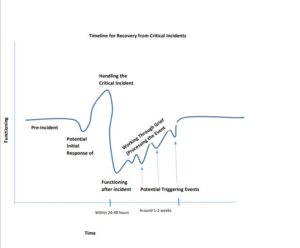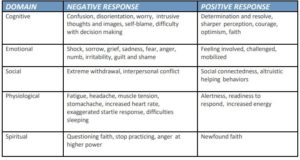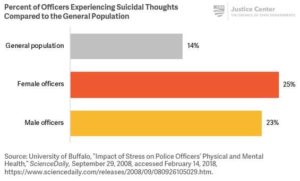What are Critical Incidents?
Critical Incidents are challenging events that have the potential to cause you distress and overwhelm your coping mechanisms. Often as a first responder or emergency worker you are deployed from one crisis to the next, return back to work daily for long shifts, forced overtime, and the nature of the work can never give your body an opportunity to rest and complete your stress response from what you witness and experience daily.
What is Critical Incident Stress?
Critical Incident Stress or traumatic stress is your body’s normal response to witnessing, responding, managing a challenging event. Your body produces various physical, psychological, and social symptoms. This does not occur in every workplace experience or call. The intensity of the stress response from one of these events will change over time. To help yourself heal quicker, it is helpful to recognize some of the common stress reactions of a trauma response.
For More Information on Critical Incident Stress : Understanding Responder Stress (cdc.gov) and CIR STRESS INFORMATION
Common Signs and Symptoms of Critical Incident Stress

Uncommon Symptoms of Critical Incident Stress- Seek Support Immediately
- You are having any thoughts of wanting to harm yourself or kill yourself
- You are having feelings of hopelessness, severe depression and/or rage
- You feel like your life is falling apart (an increase in experiencing marital problems, relationship concerns, family conflict, loss of friendships, and problems at work)
- You are suffering from chronic physical problems that there does not seem to be any organic cause for
- You are constantly pre-occupied with thoughts and images of the events
- You are feeling desperately lonely and afraid, disabling guilt about the event
- You are unable to make decisions (even small ones) and difficulty concentrating
- Symptoms that are persisting for over 30 days
- You are becoming overly dependent on alcohol or other drugs to block the pain- complete this anonymous Survey to explore if you are overly dependent
If at any time you have thoughts of harming yourself, call EAP , 716-681-4300 to speak with an EAP counselor, or the National Suicide Prevention Hotline at 1-800-273-TALK, or text “MHA” to 741-741 to talk to a trained counselor from the Crisis Text Line.
Strategies to Manage Critical Incident Stress
- Drink Water – flushes chemicals and toxins that flood your body after a critical incident and keeps you hydrated
- Rest/Sleep – helps you register what’s happened and heal your mind
- Exercise – doesn’t have to be high-impact; a 30-minute walk every day or swimming lowers your cortisol and lowers stress levels
- Peer Support – go to ICISF trained first responders who will listen, not be judgmental, and will maintain confidentiality- see if your department has a peer support team
- Counseling – mental health check-up after experiencing a critical incident – this could be as simple as one or two sessions
- Training – CSID training/seminars, mental health training
- Recreation – don’t lose your hobbies! Hobbies help take your mind off of the job and not bring it home with you.
What Family Needs to Know about Critical Incidents
These types of calls impact the family as well as you might be seeing the after effects of the call in your first responder. Preparing for these days and types of incidents can help your family bounce back and recovery faster from a critical incident . Here are some ideas to be prepared for these days for your first responder:
- For the First Responder- think about sharing if it was a tough day so your loved ones know to give you time and space or check in to see what you need
- For the Family
- Ask your first responder what they might need from you to feel supported
- Listen if they want to talk, and do not use judgement statements. Stick to active listening skills
- Offer to take some roles and responsibilities off their plate for a couple days after the event within the home while they recovery
- Lower your expectations of how they can support you around the house for a few days
- Seek your own support to process and manage your feelings and emotions – EAP is a free benefit to all household members of covered employees
For more information: CI Stress for Family Members
Other Immediate Support Resources:
WNY Helpline -716-858-2677- Confidential peer services. You can call and talk to someone today that understands this feeling. We are here 24/7 for any Law Enforcement officer. Also available for any family members that are feeling this way as well. You are not alone.
Safe Call Now – (206) 459-3020 – Confidential Peer services
Western New York Trauma Recovery Network: We are committed to strengthening and supporting the Western New York community after a natural or human-made disaster by offering pro bono EMDR Therapy. Our skilled team of EMDR therapists are prepared to provide EMDR Therapy to the community of first responders during identified traumatic events.
NYLEAP– free training seminars designed to assist first responders involved in on duty critical incidents
